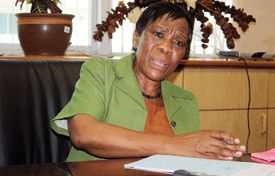Another BOFEPUSU judgement today
OARABILE MOSIKARE
Staff Writer
| Tuesday May 14, 2013 00:00


In August 2011, the Director of Public Service Management (DPSM) wrote to the five unions informing them that she was terminating organisational rights which the applicants, as recognised unions, had hitherto enjoyed.The then DPSM director Festinah Bakwena wrote that she had decided to cancel facilitation for the deduction of loan repayments to unions and micro lenders. Bakwena also told them she had decided to withdraw provision of office accommodation assistance to Botswana Public Employees Union (BOPEU). and that DPSM would ceased secondment of public service employees to unions.
Bakwena also terminated provision of transport for union activities and required renegotiation of the terms of government assistance to unions. Other affected unions were Botswana Land Board and Local Authorities and Health Workers Union (BLLAHWU), Botswana Sectors of Educators Trade Union (BOSETU), Botswana Teachers Union (BTU) and the National Amalgamated Local and Central Government and Parastatal Workers Union (NALCGPWU).
Through their lawyers, Rantao Kewagamang Attorneys, the unions argued that the decisions communicated to them were not preceded by any consultation with the unions or given an opportunity to submit representations.Attorney Tshiamo Rantao had contended that the decisions impacted adversely on their rights, which were entrenched in the agreements. He said the unions had a legitimate expectation to a hearing prior to the taking of the decisions. '...It can then be asked whether the director has any right either to require the re-negotiation of the agreements or to withdraw the rights conferred by the agreements. If she had such right, the question of a proper process for the exercise of such rights arises,' said Rantao.He said the appropriate remedy is the setting aside of the decision of the August 2011, in its entirety with costs.
Opposing the unions' application, attorney Nchunga Nchunga, for the DPSM and the Attorney General, said provision of office accommodation to BOPEU was just a favour extended during the formative years. 'It has to be appreciated that it is not the responsibility of DPSM to provide office accommodation to the second applicant or any of the applicants. DPSM also communicated to the applicants that it would cease secondment of public service employees to union offices. Such secondment is not sustainable in the long-term,' he said.
Nchunga also argued that continuation of provision of transport union members to congresses, annual conferences and governing councils would be burdensome and unsustainable in existing economic times where all budgets are undergoing belt-tightening. He said it would also not be in keeping with international best practice of letting unions operate independently and autonomously from government. He further submitted that assistance cannot be elevated to a full right, adding that assistance is only feasible for as long as it is sustainable. Further, Nchunga said the unions' application should be dismissed with costs because 'it has no merit and is misguided'.
